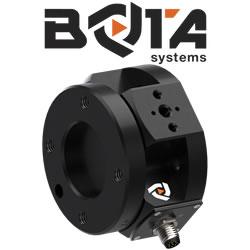New Planetary Gearbox Revolutionizes Deep Drill Technology
In September 2010 Maxon launched the groundbreaking EC22HD Heavy Duty Downhole Drilling Motor. In combination with its matching GP22HD Heavy Duty Planetary Gearbox, operation on the 'limit of what is bearable' in Deep Drill Technology is now a reality.
In September 2010 Maxon launched the groundbreaking EC22HD Heavy Duty Downhole Drilling Motor. In combination with its matching GP22HD Heavy Duty Planetary Gearbox, operation on the 'limit of what is bearable' in Deep Drill Technology is now a reality.
The GP 22 HD is designed to operate in submerged oil operation (flooded in hydraulic fluid). The version for operation in air is under design.
The GP 22 HD features:
• 1 to 5 stages
• Max. overload torque up to 12 Nm*
*The maximum permitted torque that can be applied for a short period of time (a few seconds) without destroying the gearbox. It can be considered as breakaway torque, for example, to overcome static friction of a mechanically jammed drive.
• Ambient temperatures up to 200C (390F)
• Atmospheric pressures up to 1700 bar (25000 psi)
• Submerged oil operation (flooded in hydraulic fluid)
• Vibrations up to 25 grms
• Impulses and impacts up to 100 G (100 times gravitational acceleration)
• Service life approx. 100-1000 hours, at load limit (180C, oil) currently approx. 500 hours
For more information on Maxon's Downhole Drill Motors & Gearboxes, click on the link below:
http://www.electromate.com/products/?keyword=downhole&product=&partner=&x=20&y=7
A copy of this Press Release can be viewed at-
http://www.electromate.com/news/?c=pressreleases&press_id=10527
For more information, please contact:
EDITORIAL CONTACT:
Warren Osak
sales@electromate.com
Toll Free Phone: 877-737-8698
Toll Free Fax: 877-737-8699
www.electromate.com
Featured Product

Bota Systems - The SensONE 6-axis force torque sensor for robots
Our Bota Systems force torque sensors, like the SensONE, are designed for collaborative and industrial robots. It enables human machine interaction, provides force, vision and inertia data and offers "plug and work" foll all platforms. The compact design is dustproof and water-resistant. The ISO 9409-1-50-4-M6 mounting flange makes integrating the SensONE sensor with robots extremely easy.
No adapter is needed, only fasteners! The SensONE sensor is a one of its kind product and the best solution for force feedback applications and collaborative robots at its price. The SensONE is available in two communication options and includes software integration with TwinCAT, ROS, LabVIEW and MATLAB®.
